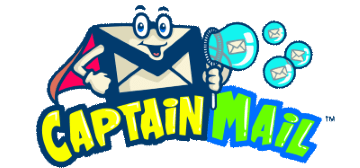Captain Mail Research Round Up
Here is a Captain Mail Research Round Up on the educational benefits of Captain Mail:
1. Captain Mail Uses a Kid-Friendly & Accessible Format
Studies have shown that san-serif typefaces -- those without additional flourishes -- are best for reading because they increase legibility. Sans serifs are preferable for developing readers because their simplified letterforms are easier to recognize. This is especially true with learners with disabilities (like dyslexia) or visual impairments, because letters that look similar may be confused or fonts with too much visual noise can cause stress and interrupt reading.
Captain Mail uses sans-serif fonts in an easy-to-read format so children can access the words quickly and without additional effort.
2. Reading Captain Mail Letters Can Lead to Improved Fluency & Stamina
There are three dimensions to fluency: accuracy in word decoding, automatic processing, and prosodic reading. Fluency is considered a bridge to reading comprehension, and as children improve across these three metrics, they will better comprehend texts and become more motivated readers. More motivated readers seek out a greater number of texts and read for longer, increasing their stamina. As they read more -- more often and for longer periods -- motivated readers will deepen their decoding and word recognition skills, strengthen their automaticity, and increase their vocabulary.
Children who struggle with fluency may be able to decode words, but if they have insufficient automaticity, they will not enjoy the process of reading. Both inaccurate reading and minimal reading practice slow the development of fluency in beginning readers, so it is important that they get fluency practice with high-engagement texts.
Captain Mail provides high-engagement texts each week for children who may not otherwise find a topic they love in a book. By changing the subject matter each week, Captain Mail allows for children to truly dive deeply into a topic and spark their interest. For subjects they’re particularly interested in, they may read the Captain Mail more than once, resulting in increased opportunity for improved fluency and stamina.
3. Learning from Captain Mail each Week Can Lead to Improved Cultural Literacy & Comprehension Skills
Studies show that children improve in reading comprehension as they steadily acquire background knowledge. This suggests that, rather than practicing discrete reading comprehension strategies, children should be reading across content areas and building their “cultural literacy.” Developing readers should therefore explore texts that expose them to the full range of the human experience and that introduce them to other people, lands, cultures, and concepts. This will arm them with the rich background knowledge and vocabulary that will activate their schema and help them read with greater understanding, no matter the difficulty of the text.
Captain Mail, in partnership with Encyclopedia Brittanica, provides a wide variety of information so each child is sure to find something they want to learn more about. However, weekly exposure to information a child may not research on their own also provides children with improved cultural literacy and reading comprehension skills.
4. Captain Mail Provides a Weekly Opportunity for Activity-Based Learning
Studies show that learning is enhanced when new content is paired with related activities. This is known as “activity-based learning,” and when the activities have either cultural or personal relevance, then children will be more motivated to learn, will engage more deeply with the material, and will remember it longer. Additionally, when children apply their learning in real-world contexts, they are more likely to stay continuously engaged, ask thoughtful questions, and navigate ambiguities. Perhaps most importantly, activity-based learning lets children with different learning styles show what they know in creative ways and gives them a sense of accomplishment once the task is completed.
Captain Mail allows for children and caregivers to come together each week to dive deep into a topic and explore through a hands-on, thought-provoking activity.
 Free USA Shipping / International Shipping From $1.50
Free USA Shipping / International Shipping From $1.50
